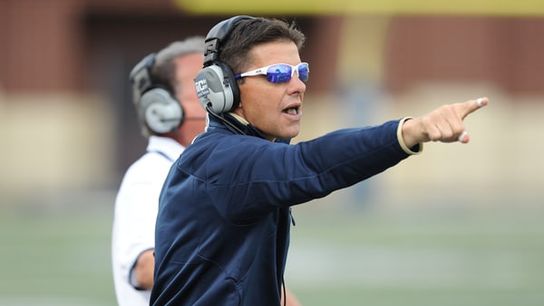Akron defensive line coach Todd Stroud has always run, always lifted, and always been a football coach. For his entire adult life, that's all he's known. But last year he added some new rituals to his routine: constantly disinfecting his hands to protect a broken immune system, huddling by the heater in his office because air conditioning gave him chills and, every Monday night, low-dose chemotherapy.
At the prodding of his wife, Stroud visited a doctor last spring, where he was ultimately diagnosed with amyloidosis, a cancer-like blood disease caused from a buildup of protein in the organs. Most patients with amyloidosis live between 12 and 36 months.
“He doesn’t take even a Tylenol, doesn’t get headaches. His family is very strong, healthy, vibrant people,” Stroud's wife Marianne told the Akron Beacon-Journal. “All of a sudden, symptom by symptom would come up. He was swollen in the eyes, like he’d eaten a pound of potato chips. He had a cut on his lip that didn’t heal for over a year. The biggest thing was a persistent cough that progressively worsened. That was a great reminder because every day he would cough.”
With no other choice available to him, Stroud persevered. “I read it and I said, ‘Oh, [crap]. This is a bad scene,’ ” Stroud said. “You get your life in order. You get yourself ready to die. That’s a tough thing to swallow when you feel pretty good. Then you meet with the doctors and you realize there’s a lot of hope and a lot to live for and you can extend your life a pretty good bit.
He underwent treatment while never missing a beat coaching the Zips' defensive linemen. He was diagnosed in May and underwent a stem cell transplant over the summer, from which he returned to the field well before doctors' orders. “He’s a walking testimony to what you can overcome and not let it get you down,” head coach Terry Bowden said. “It’s been an incredible story.”
“After the stem cell chemo, he’d get up in the morning and he’d be puking," Marianne said. "He’d continue on his [workout], get in the shower, go back and puke some more. When you’re going through it you think, ‘Can you make it another day?’ It took him to his knees, but he would stand straight back up every time.”
Though the prospect of more chemotherapy has not been ruled out, the 52-year-old's life expectancy has grown from 36 months to 20-to-30 years. “You find out being in athletics, the biggest part of this whole situation is mental," Stroud said. "You picture yourself where you want to be six months from now and how you want to do it and make it become reality, just like a player uses visualization. It goes back to what’s between your ears and your belief in God.”
The full article by the Akron Beacon Journal is a great read. Power of positivity!
